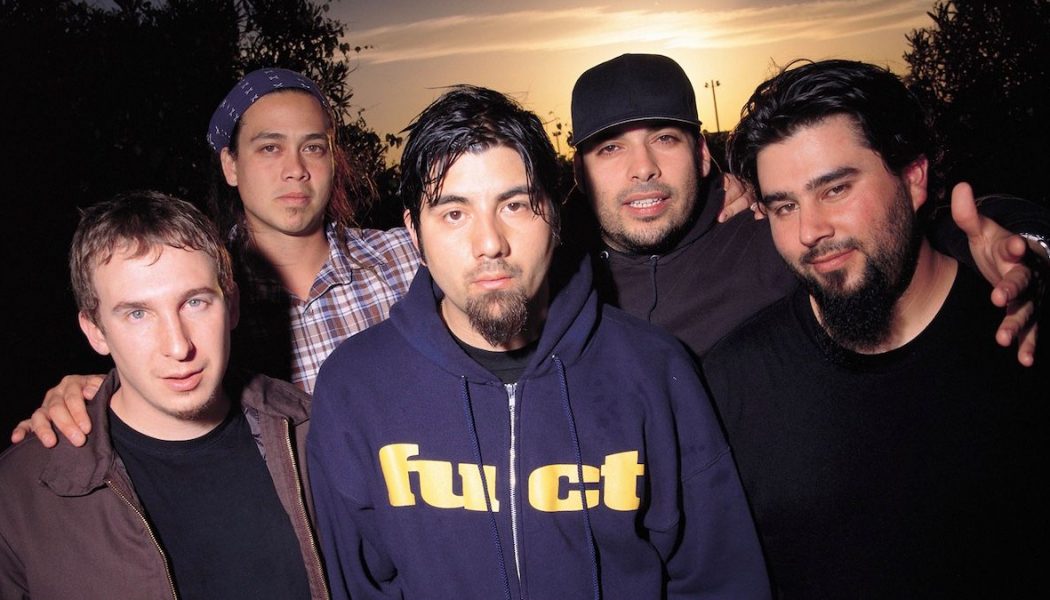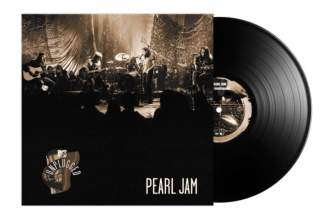
Gimme a Reason takes classic albums celebrating major anniversaries and breaks down song by song the reasons we still love them so many years later. This week, we celebrate 20 years of Deftones’ White Pony.
In 2000, nu metal ruled the airwaves. It’s then-novel mixture of alternative rock choruses, heavy metal riffs tuned lower than ever before, and hip-hop verses and rhythms had been on a half-decade growth streak. It’s juggernaut acts, like Korn and Limp Bizkit, were ubiquitous. One of the genre’s most forward-thinking devotees, a cadre of Sacramento upstarts known as Deftones seemed hot on their tails, thanks to the success of the singles “My Own Summer (Shove It)” and “Be Quiet and Drive (Far Away)” from their 1997 album Around the Fur.
However, rather than be keep following the path of the genre of the moment, Deftones were about to execute a slingshot maneuver, using nu metal’s commercial gravity to propel them into deep space. Their mission into the void launched on June 20th, 2000, with the release of their groundbreaking third LP, White Pony.
Recorded at Larabee Sound in West Hollywood and The Plant in Sausalito with producer Terry Date between August and December 1999, White Pony cost more money and occupied more time than any Deftones record previously. It took an emotional toll as well—its writing and recording sessions were characterized by arguments between vocalist Chino Moreno and guitarist Stephen Carpenter, who quarreled while their bandmates, bassist Chi Cheng, drummer Abe Cunningham and now-permanent turntablist and synth player Frank Delgado, drowned out the fighting with long hours playing Tony Hawk’s Pro Skater 3.
The conflict and ennui, though, sharpened White Pony the way that hot hammering and cold water sharpen a fine knife. The finished record expanded the band’s sound by leaps and bounds, adding influences from goth rock, dream pop, new wave and post-punk without sacrificing the band’s core musical ideas. From the computerized wet dream of “Digital Bath” to the indelible punch of “Change (in the House of Flies),” each of White Pony’s explorations fit into a unified whole thanks to a pervasive morbid and dreamlike mood. Its blend of then-contemporary commercial songs, avant-garde flourishes and eclectic influences deserve as much credit as Radiohead’s Kid A, which four months later would do to alternative rock what White Pony did to heavy music.
Twenty years after its release, White Pony remains the most commanding artistic statement in Deftones’ career, and a testament to the innovative spirit that animates those artists brave enough to wander outside the bounds of convention. Deftones, like their fans, felt like more, and for that we celebrate 20 reasons we still love White Pony.
01. Every great story involves conflict, and White Pony is no exception. Stephen Carpenter and Chino Moreno notoriously clashed while writing the record—the former wrote much of the band’s earlier material, but the latter was coming into his own as a songwriter while making White Pony. Multiple Moreno compositions made the final cut, with Moreno on guitar, including “Digital Bath”, “Rx Queen”, and the indomitable “Change (In the House of Flies).” White Pony’s balance between Moreno’s delicate pop rock ballads and Carpenter’s slash-and-burn metal riffs became Deftones’ signature sound.
02. “Back to School (Mini Maggit)” wasn’t included on the original pressing of the record. Deftones’ label requested it be added to the album as a single. Even though singles added at label requests don’t have a great reception “Back to School” is pretty great – the band’s most concise and hard-hitting entry into the rap-rock genre they left behind during White Pony, with one of Chino’s most coherent verses. It has a different energy from the remainder of the record — the transition between its jocular and bratty attitude and the lewd brooding of “Fecetiera” is pretty jarring — but it’s an essential cut anyway.
03. “Feceteira,” the original opener for the album, sets the tone with a mix of dreamy melodies and churning rhythms. Carpenter’s guitar chugs and soars in turn, and the rapid switching between these two approaches underscores White Pony’s audio aesthetic — juxtaposing nocturnal neon and gutter grime. Not to be outdone, Moreno shows off his vocal range, with moaning verses, a spoken word bridge, and an intimate, hissing chorus.
04. In Portuguese, “Feceteira” means “witch” or “female wizard.” It’s a suitable title for one of the band’s most narrative songs. Chino’s lyrics details a nightmarish fantasy about the main character being kidnapped by a woman, imprisoned in the trunk of her car, and forcibly photographed in sexually compromising positions. Its emotional mixture of lust and misanthropy encapsulates White Pony’s emotional breadth in one cohesive tune. It also lays the groundwork for a then-new lyrical mode for Moreno, one outlining dreams and fantasies rather than autobiographical stories.
Click ahead for more reasons we still love White Pony…










